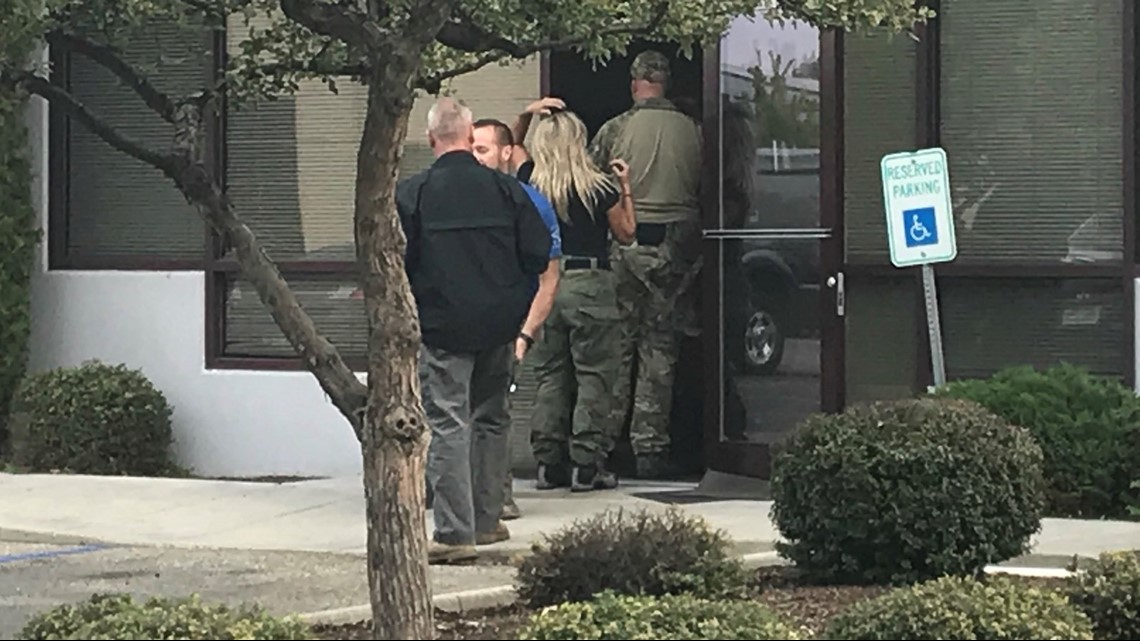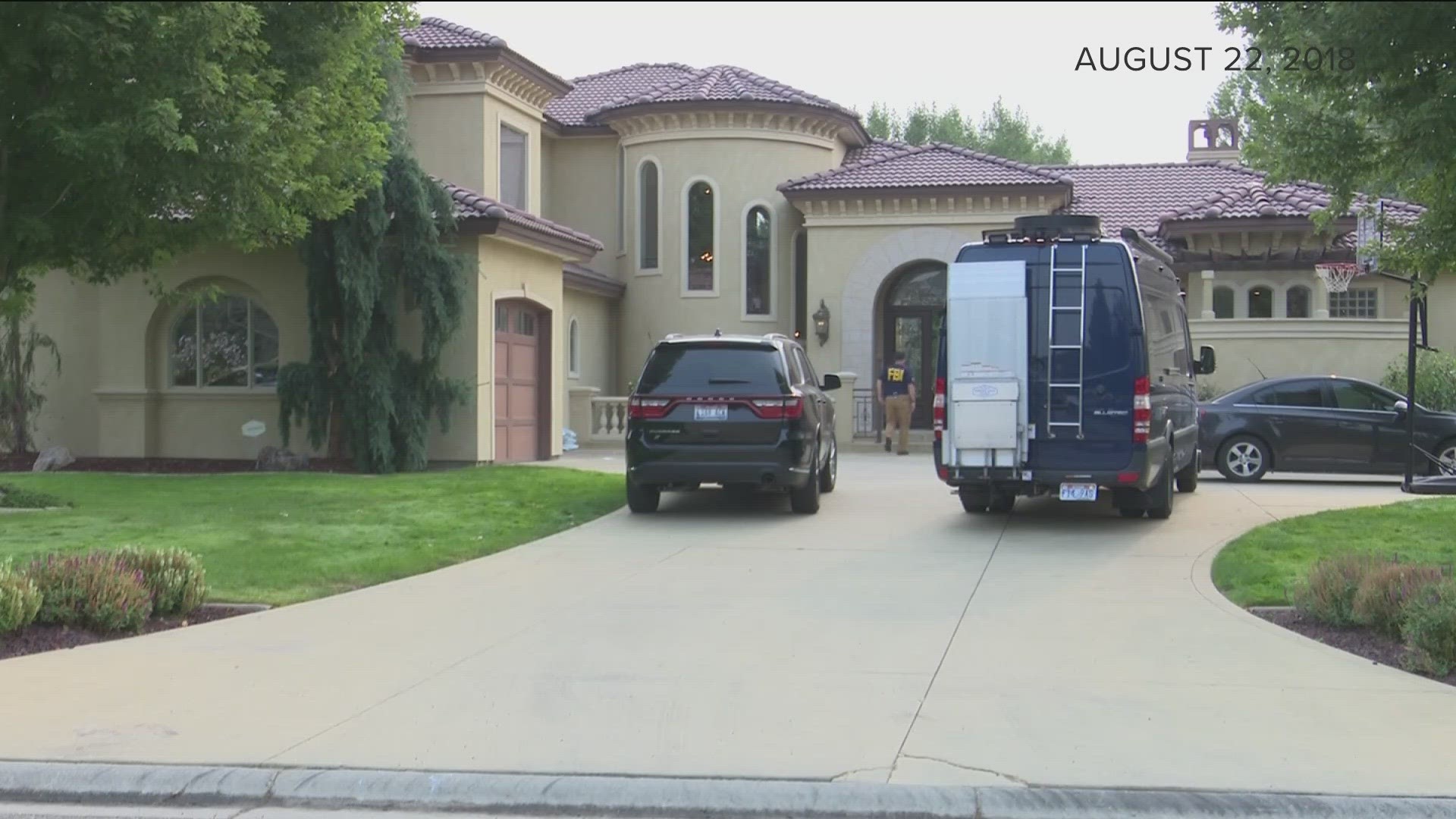BOISE, Idaho — Editor's note: This story, first posted Thursday, March 23, has been updated with information about monetary forfeiture judgments, comments from the office of the U.S. Attorney for the District of Idaho, and information about court filings indicating at least two defendants' intent to appeal.
Five people convicted in connection to a multi-million-dollar scheme involving counterfeit cell phones and cell-phone accessories have received federal prison sentences, following three days of hearings at the federal courthouse in Boise. A sixth person, who pleaded guilty and did not stand trial, will serve probation.
The defendants also have been ordered to forfeit a combined total of nearly $52 million in proceeds from the fraudulent sale of counterfeit trademarked cell phones and accessories, the U.S. Attorney's Office announced on the Monday following the sentencings.
Paul (Pavel) Babichenko, Peter (Piotr) Babichenko, Timofey Babichenko, David Bibikov and Michael (Mikhail) Iyerusalimets in August 2022, following a trial that lasted more than two months, were convicted on multiple counts, including conspiracy to commit wire fraud and conspiracy to traffic in counterfeit goods. Artur Pupko pleaded guilty to trafficking in counterfeit goods.
Here are the sentences that Senior U.S. District Judge B. Lynn Winmill handed down in hearings that took place March 21-23:
Timofey Babichenko, convicted of a total of seven counts for the crimes of conspiracy to commit wire fraud, conspiracy to traffic in counterfeit goods, wire fraud and trafficking in counterfeit goods, is sentenced to four years in prison, followed by three years of supervised release. He also was ordered to pay a fine of $10,500 and a special assessment of $700. A forfeiture money judgment of more than $9.2 million also was entered against him.
Piotr Babichenko, convicted of conspiracy to commit wire fraud and conspiracy to traffic in counterfeit goods, was sentenced to four years in prison, followed by three years of supervised release. He also was ordered to pay fines totaling $10,000, plus a special assessment of $200. A forfeiture money judgment of more than $3.3 million was entered against him.
Pavel Babichenko, convicted of conspiracy to commit wire fraud, conspiracy to traffic in counterfeit goods and trafficking in counterfeit goods, was sentenced to six years in prison, followed by three years of supervised release. He also was ordered to pay a total of $21,000 in fines and a special assessment of $300. A forfeiture money judgment of more than $33.7 million was entered against him.
Mikhail Iyerusalimets, convicted of eight total counts of conspiracy to commit wire fraud, conspiracy to traffic in counterfeit goods and wire fraud, has been sentenced to two months in prison, followed by nine months home detention, then three years of supervised release. He also was ordered to pay a special assessment of $800 for each of the eight counts. A forfeiture money judgment was entered against him in the amount of $953,411.95
David Bibikov, convicted of conspiracy to commit wire fraud, conspiracy to traffic in counterfeit goods and two counts of wire fraud, is sentenced to one month in prison, followed by nine months of home detention, then three years of supervised release. He also was ordered to pay a special assessment of $400. A forfeiture money judgment of more than $4.7 million was entered against him.
Artur Pupko, who pleaded guilty to three counts of trafficking in counterfeit goods, was sentenced to five years of probation and ordered to pay a $10,000 fine plus a special assessment of $300. For the first six months of probation, Pupko will be restricted to his home except when travel is necessary for employment, education, religious services; medical, substance abuse or mental health treatment; attorney visits; court appearances; court-ordered obligations; or other activities as pre-approved by his probation officer.
A future hearing will determine restitution and repayment of public defender attorney fees, the U.S. Attorney's Office said.
"The convictions, sentences, and financial recovery in this case reflects our ability to work with our law enforcement partners to take down large-scale and long-term fraud enterprises that cross borders," U.S. Attorney Josh Hurwit said.
For those sentenced to prison time, the court is recommending that they be placed in the minimum-security satellite camp at the federal correctional facility in Sheridan, Oregon. The defendants have an opportunity to appeal the judgments.
As of Monday, March 27, attorneys for Pavel and Piotr Babichenko have filed motions for release pending appeal. Online court filings indicate that they believe that the court erred by precluding the defense's phone experts from testifying that the phones were authentic Apple and Samsung products, that the court abused its discretion by allowing prosecutors and their witnesses to, in the defendants' view, "repeatedly misuse the term 'counterfeit' at trial," and that the court erred by not instructing the jury on the "repackaging defense" in subsection (g) of the federal law related to trafficking in counterfeit goods or services. On the issue of the "repackaging defense," the defendants' attorneys argue that the jury should have been instructed that for the defendants to be found guilty of trafficking in counterfeit goods, the government needed to prove beyond a reasonable doubt that they used a mark with the intent to deceive or confuse a consumer regarding the origin of an item.
Federal prosecutors alleged that from January 2008 until August 2018, the defendants engaged in a scheme to sell counterfeit electronic devices, including devices purported to be Apple and Samsung phones and accessories, and defrauded customers in the Treasure Valley and on online marketplaces such as Amazon and eBay.
After the convictions last August, Hurwit said the evidence showed some of the products sold in the scheme were capable of causing burns, fires or electrocution.
A total of nine people were indicted and put on trial in this case after being arrested in 2018, when federal agents and local law enforcement raided several locations in Ada County, including retail and warehouse locations, homes and a church building.


More than 100,000 pieces of evidence were collected over the course of the investigation. The U.S. Marshal's Service, U.S. Postal Inspection Service, the IRS, the FBI, Homeland Security Investigations, Boise Police Department, Meridian Police Department and the Ada County Sheriff's Office all worked on the case.
In the first trial, which took place in the summer of 2021, the jury acquitted Natalya Babichenko and the court dismissed the case against Gennady Babichenko.
The jury in the 2021 trial was deadlocked on multiple charges against seven defendants, who were retried in a trial that ran from May 18, 2022, to Aug. 1, 2022. Two of those seven defendants, Kristina Babichenko and Anna Iyerusalimets, were found not guilty on all of the counts against them.
Watch more Local News:
See the latest news from around the Treasure Valley and the Gem State in our YouTube playlist:

